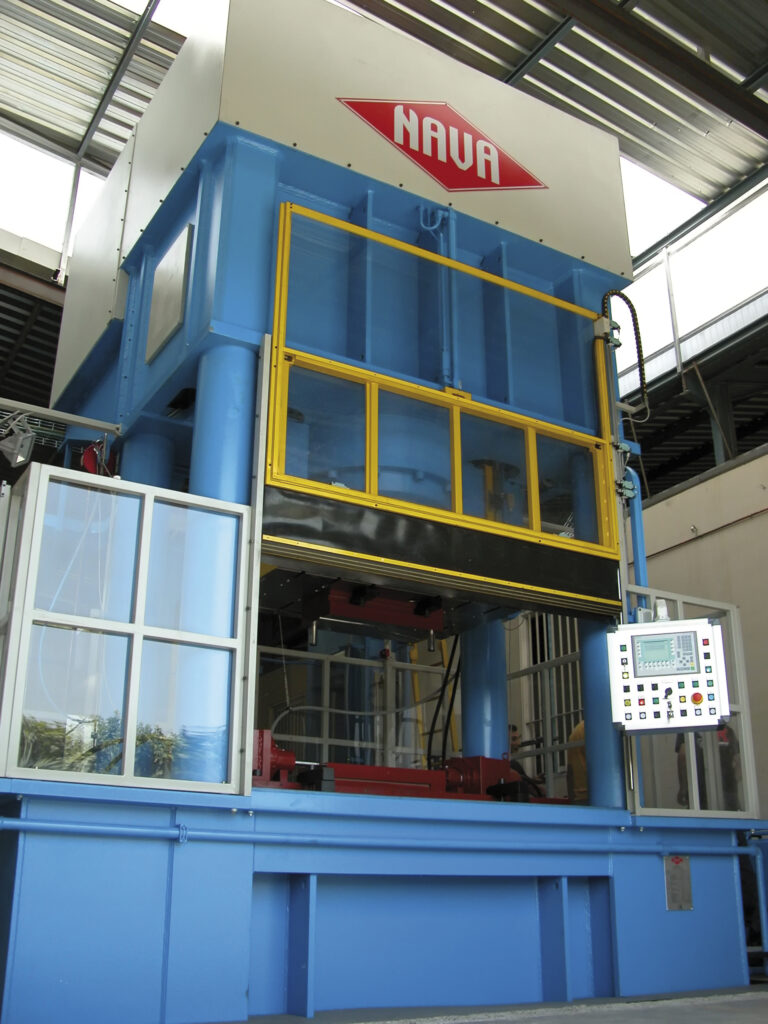 The company F.lli Nava, quartered in Monza, is pleased to present one of its new applications implemented for the hydroforming of hollow parts. The technological benefits provided by this method allow obtaining more accurate products, with better stress-relieved material, not subjected to residual welding stresses that are typical of formed and then matched parts, with more uniform thickness, more regular surface aspect and more favourable dimensional specifications. This process proves to be winning compared to components obtained by casting in terms of lightness, absence of blowholes, better surface quality and almost absent defectiveness. This application implemented by Nava company essentially consists of a 7000 kN hydraulic press, used for closing with vertical motion of the upper half of the die, of a pressure multiplier group, which produces very high pressure water to be injected inside the tube to make it perfectly adhere to the die cavity, of two cylinders that operate the thrust plugs, opportunely shaped to grant tightness at the two ends of the tube to be inflated. With such technology, successfully implemented both in the industry of exhausts sector and of structural parts for motorbikes, as well as more in general in the ambits where the manufacturing of tubular components with complex shape and variable geometry is demanded, it was possible to achieve relevant saving on the unit cost of the finished part, thanks to the several strong points of the solution developed. In the specific case of motorbike exhausts, the manufactured component is winning not only for the cost optimization and the better aesthetical look but it also allows “squeezing” some additional precious horsepower from the engine while keeping other features unchanged. Thanks in fact to the absence of welds and to the smoother developing of the pipe geometry, you achieve an outflow of combustion gases with lower flow resistances. Among the technological novelties developed by Company Nava, also the new process adopted for the annealing of the tube is very important, necessary as intermediate step between bending and hydroforming. Besides, the implemented machine operates as flexible machining centre thanks to the mechanical interface system developed, able to orient the cylinders of thrust plugs with great freedom. In that way the customer can carry out its changeovers in very short times, in compliance with the production cycles dictated by the market instead of producing for stocking. The solution is therefore characterized by excellent operating flexibility and by high productivity, also thanks to special devices adopted in the inflation cycle that allow saving precious seconds in each forming cycle. All that is interfaced with the operator through supervision software with the typical features of Nava production: user friendliness, Windows environment, intuitiveness of controls and communications through which the system interacts with the operator.
The company F.lli Nava, quartered in Monza, is pleased to present one of its new applications implemented for the hydroforming of hollow parts. The technological benefits provided by this method allow obtaining more accurate products, with better stress-relieved material, not subjected to residual welding stresses that are typical of formed and then matched parts, with more uniform thickness, more regular surface aspect and more favourable dimensional specifications. This process proves to be winning compared to components obtained by casting in terms of lightness, absence of blowholes, better surface quality and almost absent defectiveness. This application implemented by Nava company essentially consists of a 7000 kN hydraulic press, used for closing with vertical motion of the upper half of the die, of a pressure multiplier group, which produces very high pressure water to be injected inside the tube to make it perfectly adhere to the die cavity, of two cylinders that operate the thrust plugs, opportunely shaped to grant tightness at the two ends of the tube to be inflated. With such technology, successfully implemented both in the industry of exhausts sector and of structural parts for motorbikes, as well as more in general in the ambits where the manufacturing of tubular components with complex shape and variable geometry is demanded, it was possible to achieve relevant saving on the unit cost of the finished part, thanks to the several strong points of the solution developed. In the specific case of motorbike exhausts, the manufactured component is winning not only for the cost optimization and the better aesthetical look but it also allows “squeezing” some additional precious horsepower from the engine while keeping other features unchanged. Thanks in fact to the absence of welds and to the smoother developing of the pipe geometry, you achieve an outflow of combustion gases with lower flow resistances. Among the technological novelties developed by Company Nava, also the new process adopted for the annealing of the tube is very important, necessary as intermediate step between bending and hydroforming. Besides, the implemented machine operates as flexible machining centre thanks to the mechanical interface system developed, able to orient the cylinders of thrust plugs with great freedom. In that way the customer can carry out its changeovers in very short times, in compliance with the production cycles dictated by the market instead of producing for stocking. The solution is therefore characterized by excellent operating flexibility and by high productivity, also thanks to special devices adopted in the inflation cycle that allow saving precious seconds in each forming cycle. All that is interfaced with the operator through supervision software with the typical features of Nava production: user friendliness, Windows environment, intuitiveness of controls and communications through which the system interacts with the operator.



